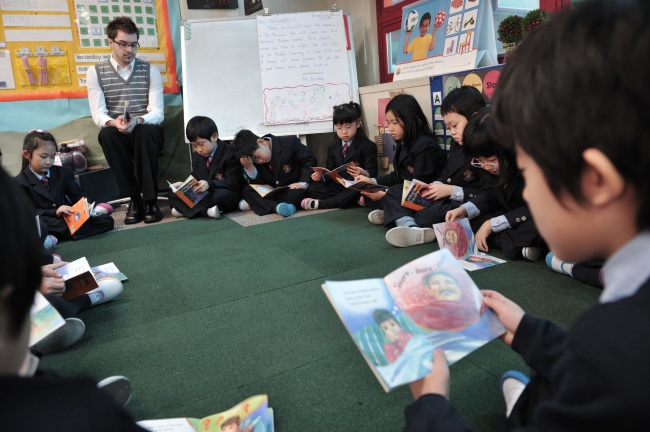The Korea Herald is launching a new weekly series titled “Uniquely Korean” on Page 3 every Thursday. This series will explore many aspects of Korea that can be classified as “unique” for readers, such as customs, practices, institutions, hot spots and social trends. The column will help guide both Korean and non-Korean readers to the hidden and intriguing gems of Korean culture. ― Ed.
Song Joo-hee (not her real name) regularly takes her 3-year-old son to a private English school in Seoul as public kindergartens here do not offer English language classes.
Despite spending more than $1,400 a month for the program, she sends her child to there in order to help him think in English and be immersed in an English-speaking environment.
“For one thing, I don’t want my son to be frightened of learning English. I believe the younger (he is when) he starts learning, the better,” she told The Korea Herald.
English-language kindergartens, more commonly known as “English kindergartens,” have become popular among Korean parents, especially those who can afford their typically high tuition fees.
These schools, which provide all their programs in English, are not classified as kindergartens but as private institutions since the Ministry of Education does not allow English to be taught in public education to students under the age of 8.
There is no official data available, but reports suggest that there are more than 200 “English kindergartens” in Seoul alone and hundreds more across the country.
Private English preschools here typically run a full-day kindergarten program, targeting children between the ages of 30 months and 6 years.
School hours and curriculum vary between schools, but typically 10-15 children in a class learn everything in English through native instructors.
Some private institutes have also started offering music, art and physical education, including ballet and even taekwondo, in English to meet demand from the growing number of Korean parents looking for ways give their children a “unique” English learning environment.
English kindergartens usually cost more than public and private ones. A recent survey by the education ministry shows that the schools charge an average monthly fee of 1.1 million won ($1,040), more than $12,500 a year ― higher than the tuition for most public colleges in Korea.
Despite the high fees, preschool English education is an emerging market in Korea and more and more Korea parents are looking for ways to give their kids a head start in English learning.
Yet, the optimal age for children to begin foreign-language learning is still a hotly debated topic here.
Some parents, especially those who aspire for their children to study overseas or work for multinational corporations, believe starting early will give them a head start and help them outstrip their peers.
Some educators argue, though, that very young children may not readily acquire a command of a second language, and may weary of learning English in their later years.
“Children also might easily miss out on the basics if they start to learn everything in English before having a good command of their mother tongue,” said Yeom ji-sook, a professor at the department of early child education at Konkuk University.
“I believe children should start to learn English after achieving a full command of their native language,” she added.
More important than the question of when to begin learning, however, may be that of the method used, according to Lee Yeon-sook, a director of English kindergarten in Seoul.
“I think language is not something that can learned through books. If language learning is to be effective it has to be fun, not a source of stress,” she said.
By Oh Kyu-wook (
596story@heraldcorp.com)








